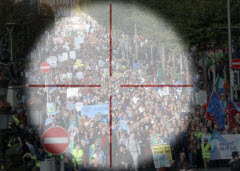The latest issue of People’s News is out now. Click here to download
Articles in this issue include
Page 1
Water charges, the EU and TTIP
Water charges can and must be defeated by resistance and non-payment; but water as a human right must also be secured as a publicly owned and controlled resource……
Page 2
The Berlin road to an EU army
Prominent German think tanks and politicians have been repeatedly calling for the establishment of an EU army but recognise that there are obstacles standing in the way……….
Page 3
Kenny misleads Dáil on EU lawmaking changes
Weighting votes on the basis of population is…….. a power grab by Germany in particular, supported by France, Italy, and Britain, to increase the weight of the big states……..
Page 6
Big Tobacco wins judicial review on EU directive
The EU’s recently agreed Tobacco Directive will be challenged in the European Court of Justice after cigarette giants won a judicial review to examine whether the bill’s provision for more health warnings and product bans is disproportionate and infringes the rules of the single market……………………….
Page 7
Belgian anti-austerity strike shakes new government
Workers from throughout Belgium converged on Brussels on 6 November to protest against the austerity measures of the new right-wing government of Charles Michel……………….
Page 7
Italian groups seek restoration of national currency
Ireland was not the only euro-zone country to get a letter from the European Central Bank……………………..…………
Page 9
“Dark, secret rooms, behind closed doors”—Juncker’s murky past
Jean-Claude Juncker, the new president of the EU Commission, was the prime minister of Luxembourg for almost two decades. In that time he oversaw the growth of a financial industry that became a tax centre for at least 340 global companies, not to mention investment funds with almost €3 trillion in net assets—second only to the United States……………….
Page 10
EU mission in Kosovo beset by allegations of corruption
The EU has asked a French academic to look at recent allegations of corruption against Eulex, its “rule of law” mission in Kosovo…………………..
Page 12
Mícheál Ó Loingsigh
Mícheál Ó Loingsigh, who died last week, was chairman of the Common Market Defence Campaign, the non-party group that campaigned against Ireland’s membership of the EEC in the 1972 referendum and provided the main arguments that were used by the various elements on the No side on that occasion. These included the Irish Congress of Trade Unions and the Labour Party, as well as both elements of the then divided Sinn Féin. He was also an active member of the Common Market Studies Group, which produced several pamphlets for the No side…………………..
Page 12
Page 17
Summing up TTIP: An agenda for corporate plunder
The corporate jargon surrounding the Transatlantic Trade and Investment Partnership (TTIP) deal is about “protecting investment,” reducing “unnecessary” barriers and “harmonising” regulations that supposedly deter free trade between the US and the EU………………..
Return of the bondholders?
A talk to be given by Dr Conor McCabe of UCD School of Social Justice and author of Sins of the Father: The Decisions that Shaped the Irish Economy. The event is being hosted by the trade unions Unite and Mandate.- Wednesday 3 December
Like this:
Like Loading...
Read Post →





















